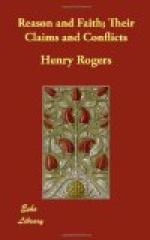declares ’the wisdom of Solomon and the poetry
of Isaiah the fruit of the same inspiration which is
popularly attributed to Milton or Shakspeare, or even
to the homely wisdom of Benjamin Franklin’ (P.
72.) in the same pleasant confusion of mind, he thinks
that the ’pens of Plato, of Paul and of Dante,
the pencils of Raphael and of Claude, the Chisels
of Canova and of Chantrey, no less than the voices
of Knox of Wickliffe, and of Luther are ministering
instruments, in different degrees, of the same spirit.’
(P. 77.) He thinks that ’we find, both in the
writers and the records of Scripture, every evidence
of human infirmity that can possibly be conceived;
and yet we are to believe that God himself specially
inspired them with false philosophy, vicious logic,
and bad grammar.’(P. 74.) He denies the originality
both of the Christian ethic (which he says are a gross
plagiarism from Plato) as also in great part of the
system of Christian doctrine.* Nevertheless, it would
be quite a mistake, it seems, to suppose that Mr.
Foxton is no Christian! He is, on the contrary,
of the very few who can tell us what Christianity
really is; and who can separate the falsehoods and
the myths which have so long disguised it. He
even talks most spiritually and with an edifying onction.
He tells us “God was,” indeed, “in
Christ, reconciling the world unto himself.”
And but little deduction need be made from the rapturous
language of Paul, who tells us that “in him
dwelt all the fullness of the Godhead bodily”
(P. 65); I concede to Christ’ (generous admission!)
’the highest inspiration hitherto granted to
the prophets of God’ (P. 143),—Mahomet,
it appears, and Zoroaster and Confucius, having also
statues in his truly Catholic Pantheon. ‘The
position of Christ,’ he tells us in another
place, is ‘simply that of the foremost man in
all the world,’ though he ’soars far above
“all principalities and powers”—above
all philosophies hitherto known—above all
creeds hitherto propagated in his name’—the
true Christian doctrine, after having been hid from
ages and generations, being reserved to be disclosed,
we presume, by Mr. Foxton. His spiritualism,
as usual with the whole school of our new Christian
infidels, is, of course, exquisitely refined,—but,
unhappily, very vague. He is full of talk of
’a deeep insight,’—of a ’faith
not in dead histories, but living realities—a
revelation to our innermost nature.’ ‘The
true seer,’ he says, ’looking deep into
causes, carries in his heart the simple wisdom of
God. The secret harmonies of Nature vibrate on
his ear, and her fair proportions reveal themselves
to his eye. He has a deep faith in the truth
of God.’ (P. 146.) ’The inspired man is
one whose outward life derives all its radiance from
the light within him. He walks through stony
places by the light of his own soul, and stumbles
not. No human motive is present to such a mind
in its highest exultation—no love of praise—no
desire of fame—no affection, no passion
mingles with the divine afflatus, which passes over
without ruffling the soul.’ (P. 44.) And a great
many fine phrases of the same kind, equally innocent
of all meaning. ____




